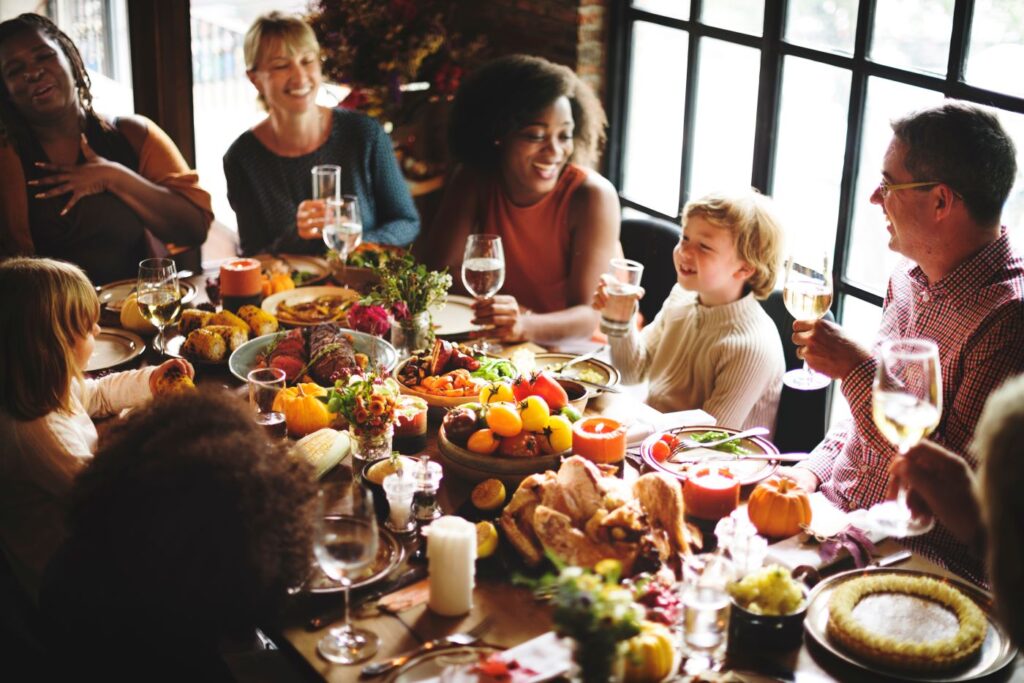This essay originally appeared on Public Discourse on Thanksgiving Day 2021. On behalf of the entire Public Discourse editorial team, Happy Thanksgiving.
However independent and autonomous we imagine ourselves, none of us is remotely self-sufficient. No matter how strong or clever, prosperous or credentialed, famous or secure, all of us are fundamentally dependent and vulnerable. We’re all one heartbeat away from radical and utter dependence, of course, but even absent the weakness and susceptibility of our bodies, we live and cannot but live within networks of dependence. Water, food, safety, medicine, sanitation, law, trade—these all depend on the many who work and watch and wait while others sleep. We would have no civilization without others.
A culture, too, is inherited from the labors of those long under the soil. Some who labored are famous and remembered, but the vast majority toiled at their looms and plows, their labs and libraries, desks and pulpits, workshops and workbenches, or foxholes and trenches, each contributing to the prosperity, peace, beauty, and order we enjoy.
I did not invent my religion, but stand in a long line; I am indebted to Moses and David, Peter and Paul, Lucy and Agnes, Augustine and Teresa, to Pope Saint John Paul the Great and my dear grandmother, may light perpetual shine upon her.
Start your day with Public Discourse
Sign up and get our daily essays sent straight to your inbox.Not only my prayers but my manners, alphabet, and numbers were given at mother’s knee. From my father I learned to drive a stick shift and keep both eyes open when the pheasant flushes. Miss Tensen taught long division, Mr. Redifer the basics of biology, and Mr. Hryniw my physics—the little I remember is my fault. Peter Kreeft gave me Aquinas.
My beloved gave me happiness, and the joy of children. Friends reminded me that I was incorrect, or that I should take the chance, or that I was fishing in the wrong spot, and poorly at that, anyway.
Virtue would seem to require not a grudging offer of thanks, not the exercise of an obligation, so much as a full, cheerful, robust experience of gratitude involving intellect, will, affection, and body.
Your life, I expect, is much like my own in this regard, whatever other differences. For better or worse, in ways we relish and in things we wish were otherwise, we created very little whole cloth. Not all is well in our lives, even though it is those very conditions and sadnesses that give us the matter from which to develop as persons and agents. But the great goods we savor and that benefit us? We created so little of those goods.
We are accustomed to think of virtue as essentially a matter of the will, an ability to follow duty against our inclinations—but this is false. Virtue, rather, is the firm disposition to knowingly choose the good and to take delight in doing so. Consequently, virtue would seem to require not a grudging offer of thanks, not the exercise of an obligation, so much as a full, cheerful, robust experience of gratitude involving intellect, will, affection, and body. On a day of thanksgiving, virtue requires us to celebrate with our entire selves.
Given the deformations in our cultural moment, many have a hard time recognizing what is good, suffering from dim eyes and occluded souls. According to Joseph Pieper, we have become hard of seeing and we struggle to see reality as good, wonderful, joyous. We are inclined to see failure and gaps rather than goodness, not, he insists, because our physiological sense is impaired, but because of a kind of “existential poverty.” Our society is not materially poor, but we are spiritually, existentially impoverished. We have thick wallets but thin and starving souls. As Pieper puts it elsewhere, the real difficulty now is not hosting a party, but finding souls rich enough to want to feast, souls desiring to celebrate.
In the end, everything comes from the generous, needless, act of God who seeks to communicate and diffuse goodness as widely as possible.
Thanksgiving Day, thus, is not merely a day off or a time to watch football and fight about politics with that one uncle—yes, we all have that one uncle. It’s really a day training us in virtue, trying to bring sight to the eyes and love to the soul.
The acrimony of our society does not come from souls formed in gratitude. The politics of personal destruction is not caused by an overflow of thankfulness. Endless critique and protest reveal eyes clouded with grievance and bitterness rather than attunement to the utter needlessness of our lives and world. We need not exist. There is no necessity to our being. Nothing we see or enjoy must exist. It all comes, in the end, from the generous, needless, act of God who seeks to communicate and diffuse goodness as widely as possible.
And yet, the good is diffused by the generosity of God and the work and kindness of the many on whom we rely. As Lincoln noted in his Thanksgiving Proclamation of 1863, we enjoy bounties so constantly that “we are prone to forget the source from which they come;” but if we were to attend, to pay attention to the “extraordinary” goodness we find, it “cannot fail to penetrate and soften even the heart which is habitually insensible to the ever watchful providence of Almighty God.”
Again we keep Thanksgiving Day; again we have the chance to become grateful, and not just for this single day. Again we are able to hold those we love, to feast in body and soul, and to become attuned to the freshness deep down in all things. To renew our loves and restore the ability to recognize the wondrous goodness that surrounds us, upholds us, that nourishes and provides for us, and upon which we so utterly depend.
Happy Thanksgiving!
Image by Rawpixel.com and licensed via Adobe Stock. Image resized.














